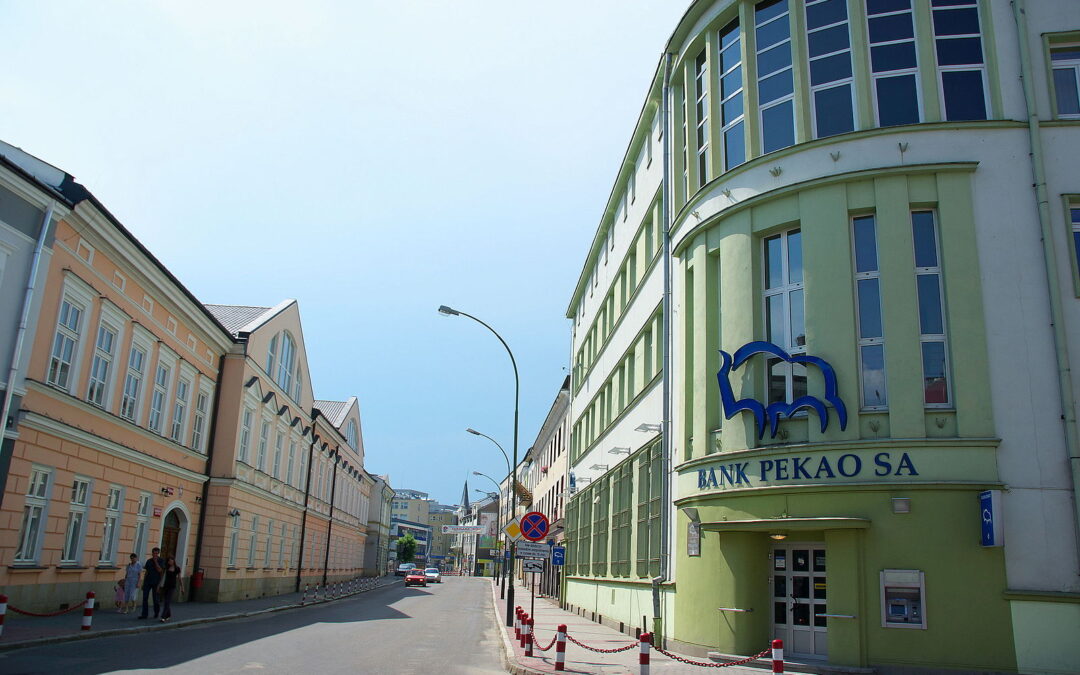For the first time, a Polish bank has introduced negative interest rates on deposits. The move has been made by state-owned lender Pekao, the second-largest bank in Poland, which has set interest rates of as low as -0.8% on large deposits by corporate clients.
In practice, it means that corporate clients will have to pay the bank for deposits, rather than receiving interest on them. The negative interest rates will, however, only affect customers with over 1 million zloty (roughly €221,000) in their accounts.
The decision is likely an attempt to lower tax costs and other banks may follow suit, reports Business Insider Polska. But retail clients are unlikely to lose out – and may even benefit.
Negative interest rates on bank deposits have appeared around Europe, largely affecting corporate clients and financial institutions since the European Central Bank (ECB) cut its base interest rate to below zero for the first time in 2004.
Yet Poland’s central bank, the National Bank of Poland (NBP), has not gone as far as its European counterpart. In late May it unexpectedly cut rates to almost zero – with a benchmark interest rate of 0.1% – making repaying interest on loans cheaper in an effort to heave the economy out of its lockdown slump.
The move, however, appears to have strained banks, which were already facing low borrowing costs since the central bank had slashed its base rate to a record low of 0.5% in April, following a previous cut to 1% in March.
Poland’s banking sector has been hit by the pandemic, with profits coming in at 6.68 billion zloty (€1.5 billion) for the first three quarters of 2020, roughly half of last year’s figure, according to NBP data.
However, some experts are surprised by the reaction of Pekao. “No one expected such a deeply negative rate,” Maciej Marcinowski, an analyst at Trigon DM, told Business Insider.
He suggested that the rationale for the move could be to dissuade other institutions from depositing funds in the bank in “an attempt to shield itself from a higher base which is used for calculating the rate of bank tax and contributions to the Bank Guarantee Fund”.
Up till now, banks have themselves shouldered the costs of safeguarding money, such as paying bank tax on deposits, but have been “unable to benefit from the liquidity invested with them” with near-zero central bank rates, explained Konrad Białas, the chief economist at TMS Brokers.
“We may be witnessing attempts to pave the way for banks to introduce negative interest rates,” added Białas, quoted by Business Insider.
According to the website, one other unnamed bank is also using negative interest rates for corporate deposits – though only those exceeding 10 million zloty (€2.2 million).
The rate rise will not directly affect retail clients. On the contrary, experts told Business Insider that it may even indirectly benefit them by allowing banks to make up for their recent shortfalls without raising the costs of personal banking products.
Moreover, with the current low rates and the uncertainty of the pandemic, Poles have turned to withdrawing more cash this year rather than depositing it in accounts.
With the rise of the second wave of the coronavirus in October, Poles withdrew almost 7.9 billion zloty (€1.75 billion) more than in the previous month – the largest increase since an even larger leap in April, the first full month of lockdown.
Jak obostrzenia epidemiologiczne, to gromadzimy zapasy. Także pieniędzy. W październiku największy miesięczny przyrost gotówki w obiegu od kwietnia. pic.twitter.com/Kj0xwquovv
— Analizy Pekao (@Pekao_Analizy) November 24, 2020
At the latest Monetary Policy Council (RPP) meeting in early December, Poland’s reference rate was kept at 0.1%, the Lombard rate at 0.5%, the deposit rate at 0%, and the rediscount rate at 0.11%.
Meanwhile, on Friday, the NBP entered currency markets, driving down the value of the zloty in a likely attempt to support economic recovery, according to the Polish Press Agency (PAP). The intervention was the central bank’s first since 2010.
Main image credit: Lowdown/Wikimedia Commons (CC BY-SA 3.0)

Maria Wilczek is deputy editor of Notes from Poland. She is a regular writer for The Times, The Economist and Al Jazeera English, and has also featured in Foreign Policy, Politico Europe, The Spectator and Gazeta Wyborcza.




















